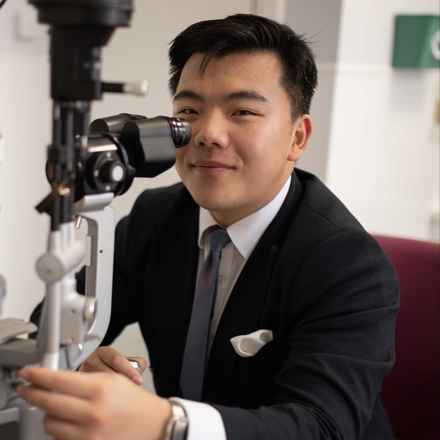New podcast to mark National Eye Health Week
Posted: Monday 23 September 2024
Looking after your eye health is important, whether you have macular disease or not.
In a new episode of our My Macular and Me podcast, launched to mark National Eye Health Week, optometrist Yuan Gao from Imperial College Healthcare Trust shares practical advice on how to protect your eyes and slow the progression of age-related macular degeneration (AMD).
In the podcast, hosted by Macular Society regional manager Vicky Thompson, Yuan discussed the importance of controlling certain risk factors that can contribute to sight loss. He also explained the lifestyle changes that can help slow the progression of any condition.
Quit smoking
Yuan highlighted that smoking is a major risk factor for AMD.
“Smokers are up to four times more likely to have AMD than people who never smoked,” he said.
His first piece of advice to any patient who smokes is to quit. “I know it's very difficult, but smoking can give you a lot of risks of having damage in the back of the eye. So, stopping smoking is something you may need to consider from today.”
Maintain good general health
Beyond smoking, Yuan highlighted the link between overall health and eye health. “If someone has high blood pressure or any cardiovascular disease, this condition can actually affect the blood flow to the retina and could potentially give the risk of having AMD,” he explained. Managing your health through a balanced diet, regular exercise, and routine check-ups is key to maintaining healthy vision.
Regular eye tests
Yuan explained the need for regular eye tests. However, beyond the usual recommendation to have a sight test every two years Yuan recommended annual eye checks for anyone over 40.
“This is my own opinion,” he said. “If you don't have any eye problems, because even if you don't feel something, some eye problems can be silenced at the beginning.”
Yuan also emphasised the importance of sight tests for children. “For young children, I advise to check their eyes more often because they need to be really careful about their myopia control,” he said.
“If they get short sighted, that's a really critical time to control it, or if there's any lazy eyes developing. So that's very important for every child to get their eye checked every year.”
Managing a diagnosis of macular disease
For those already diagnosed with macular disease, Yuan highlighted the importance of staying informed and following treatment plans.
He said: “Follow the treatment plan, try to understand why we're doing the treatment, why we're doing the injections and why we’re advising you to do the lifestyle changes?”
He added: “There's some patients really against taking medication and things at the beginning, but at least they know why. I think that's important. So, following your treatments plan is very important.”
Yuan added how lifestyle changes can be really important in the early stages too.
He said: “Lifestyle modification is quite important for the early stages.
“Because if you're taking care of the small things that reward you with the slow progression.”
Listeners were encouraged to monitor their vision at home using tools such as an Amsler grid. Yuan stressed: “Any sudden changes, make sure you don't wait, go to a specialist as soon as you can.”
Monitoring your vision at home
For those concerned about any changes to their sight, Yuan said there are practical steps they can take between eye exams. Yuan said: “There are some home monitoring tests that you can do. One of the really good ones is the Amsler grid. And those tests are designed for monitoring distortions.”
He added: “There are lots of ways to monitor vision at home, but the more important thing is if you do find any changes, see someone.”
The new episode of the My Macular and Me is available online and across all major podcast platforms.
For those who need further support or have concerns about their eye health, contact the Macular Society Helpline on 0300 3030 111 or email help@macularsociety.org.
Nutrition and lifestyle
Nutrition and lifestyle play an important role in risk and progression of AMD. Smoking, antioxidants and AREDS supplements may all play a role.
Smoking and sight loss
The earlier we give up smoking the better, but it is never too late to stop. Even if you already have AMD, it will progress faster if you continue to smoke.
Our webinars
Watch our latest webinars online. We asked the experts the questions you wanted answered: on food, staying safe at the eye clinic, and different macular conditions. Catch up with any webinars you missed, or watch again in your own time.





